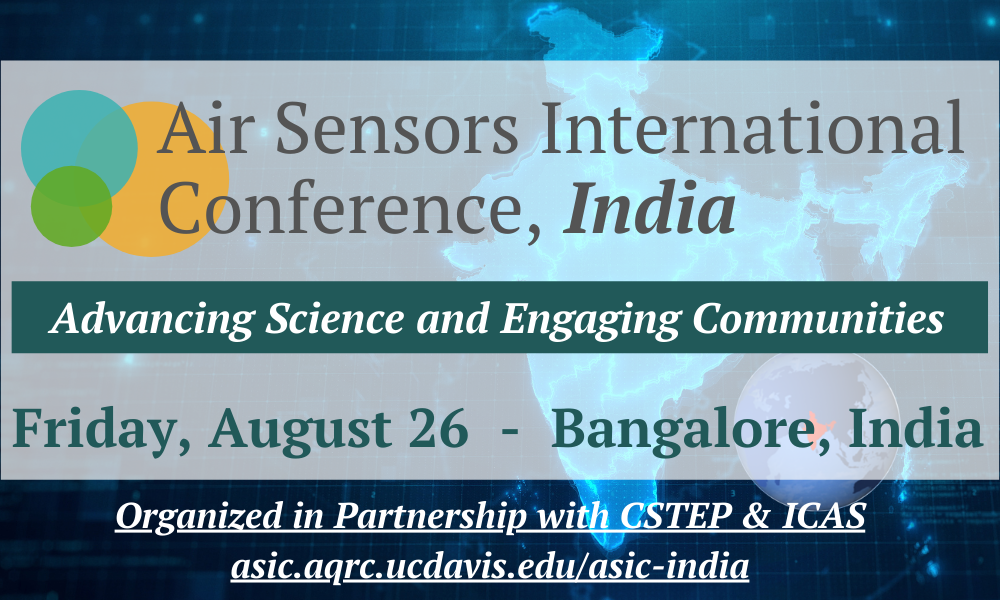
Watch Session Recordings
Date: August 26, 2022
Location: Radisson Blu Atria Bengaluru, India
ASIC in India
We are excited to announce that ASIC will be hosting an International Connection Hub in Bangalore, India this Fall. With support from the Clean Air Fund, we have partnered with Center for Science Technology and Policy (CSTEP) to build a conference focused on small, affordable air quality sensors to be held in India. This conference will be based off the structure and content from ASIC, North America, with a focus on what is relevant and timely to India communities.
This International Connection Hub (ICH) is advised by a team of international researchers and who are stationed and work in India or have conducted relevant projects within India in the recent years. The committee has gathered to define the challenge and design the conference concept listed below. The team will continue to design the program content pulling from past and current ASIC presentations as well as recruit local India researchers and program managers.
This conference will be a one-day program on Friday, August 26th after the annual India Clean Air Summit (2022 Website).
If you are interested in staying informed of the progress of ASIC, India or attending please subscribe here. If you are interested in supporting the conference financially or intellectually, please contact conference organizer, Rhanee Palma (rppalma@ucdavis.edu) or AQRC Staff (airqualityevents@ucdavis.edu) with inquiries.
Virtual or In-Person?
Currently, we are expecting that most presentations will occur in-person in Bangalore, India. However, we are constantly monitoring the COVID-19 situation carefully and we evaluate the need to move to a virtual atmosphere as we get closer. During the event, we will be following these COVID-19 safety guidelines:
- All participants are required to wear mask;
- Participants will have their temperature checked at the entrance, if the temperature is above 100.4°F (38°C) the participant/speaker will be restricted from entering the venue;
- All participants must have received a double dose of the Covid-19 vaccination.
We thank you in advance for supporting the effort to make this event COVID-free!
The Challenge
At present in India there is not a significant number of reference grade monitoring stations to track air pollution levels and sources in a majority of cities; therefore, local air sensor networks must be established to better understand the pollution concentration levels in cities and influence air quality improvements.
Some specific needs are:
- Understanding how to interpret air pollution data and the significance of it;
- Pollution Control Board members do not trust the accuracy of the data from low-cost sensors that City Managers are beginning to use;
- City Managers can use additional education and support with low cost sensors to diminish the challenges related to sensor selection, siting, maintenance and data use;
- Manufacturers need additional context and information regarding the challenges of City Managers to better address them;
- Pollution Control Board and City Managers need to more effectively assimilate data
- Communities need training on how to calibrate sensors and evaluate data
- Industry will need support in understanding, tracking and complying with the air emissions requirements mentioned in the new ESG framework
The Audience
- Concerned communities
- City managers
- Sensor developers & manufacturers
- State Pollution Control Board
- Industry (Concerned with ESG Ratings)
- Researchers
- University Students
The Vision
To improve air quality by teaching communities, city managers, industry developers and regulators, how to effectively use air quality sensors and the data produced to create massive changes in regulatory and personal actions that significantly influence air pollution levels.
The Goals & Outcomes
Design a 1-day symposium that will engage all constituents on the fundamentals of affordable air quality sensors and how to confidently use sensor data for air quality improvement within India
- Facilitate a dialogue between communities, industry members, city managers, and PCB regulators
- Teach fundamental of low-costs sensors- what they are (and how they differ from regulatory-grade monitors), how to choose, use and maintain sensors
- Teach how to develop and maintain networks
- Teach how to evaluate and use data effectively
Session Topics
- Opening Panel: Discussion of the current situation and perspectives regarding small, affordable air quality sensors and deliberate the common future we want to establish a vision that brings all perspectives together.
- Session 1A: Data Modeling & Analytics
- Session 1B: Choosing & evaluating a Sensor
- Session 2A: Data Assimilation, Sharing & Visualization
- Session 2B: Network Design & Operations
- Session 3: Performance Targets & Sensor Calibration
- Session 4: Real World Sensor Applications
- Closing Panel: How to create consensus and move forward with common standardization goals to influence improved air quality.
Technical Program Committee
| Ajay Singh Nagpure | World Resources Institute (WRI) India, Air Quality Team Program Head |
| Avijit Michael | Jhatkaa |
| Chetan Agarwal | CEDAR |
| Ethan McMahon | World Resources Institute |
| Josh Apte | UC Berkeley |
| Mohit Sharma | CII |
| Pallavi Pant | HEI |
| Pratima Singh | CSTEP |
| Priyanka DeSousa | University of Colorado, Denver |
| Ronak Sutaria | Respirer Living Sciences Pvt. Ltd. |
| S. N. Tripathi | IIT Kanpur |
| Sandra Hemingway | University of California, Davis |
| Subramanian Ramachandran | QEERI |
| V. Faye McNeil | Columbia University |
| Tanushree Ganguly | CEEW |
| Mike Bergin | Duke University |
| Swagata Dey | EDF |
| Rachana Pradhan | Air Quality Research Scientist, IIT |
